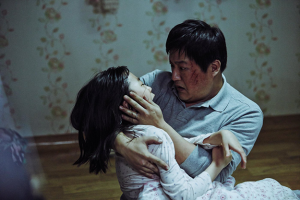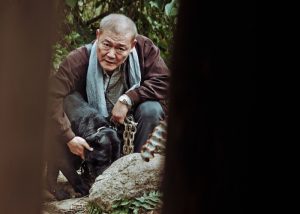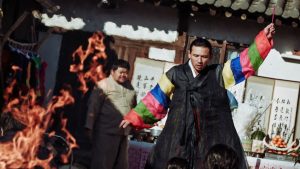
Roughly thirty minutes into “The Wailing” and I was wondering what went wrong. Na Hong-Jin, the man responsible for gripping thrillers such as “The Yellow Sea” and “The Chaser,” was churning out a goofy black magic fable in the form of a police procedural. The protagonist, Jong-Goo (Kwak Do-won), was presented as a buffoonish officer who’s constantly late to work, trips over his own two feet, and spooks himself during thunderstorms and power outages. When he’s startled or berated by his boss, he either mumbles or shrieks comically. All that’s missing from his actions is a laugh track and a twangy soundtrack. Surely, this couldn’t be the work of a master filmmaker?
Well, it is, and it’s actually quite clever. Hong-Jin is throwing the viewer off, softening their senses in order to jolt them later on. On top of that, he’s showcasing a light-hearted family man to fully convey the terror and anguish of his forthcoming curse. Portraying the lead as a well-intentioned oaf is meant to highlight the severity of the demonic forces at play, their actions driving the most innocent of individuals into a frenzy. The longer the curse has a hold of him and his family, the more violent and ill-tempered he becomes. The only issue plaguing this progression at the outset is that Jong-Goo isn’t a loveable oaf, so I wasn’t fully on board with his progression…at first. Once the tension started picking up, the puerile tone is done away with. This in turn crushes Jong-Goo’s daftness, leaving only his agony and despair, two traits that are both relatable and engaging.

It’s hard not to feel sympathy for Jong-Goo once his daughter, Hyo-Jin (Kim Hwan-hee), is possessed. She was shown as precocious in the beginning, another questionable motive that turned out purposeful. Gone is her sweet innocence, replaced now by vulgarity and violence. She lashes out at her father, heartbroken and confused. It doesn’t take long for him to start questioning his religion, bringing in a priest to help investigate.
The priest speaks Japanese, fruitful in translating an interrogation with a mysterious stranger (Jun Kunimura) stalking the peaceful village. Ever since this stranger has arrived, a rash of murders and unexplained deaths have cropped up. Some are initially tied to an overdose on mushrooms, but others have no explanation. As his daughter’s possession grows worse, Jong-Goo begins to suspect the stranger of foul play, buying into the hysteria that he’s a ghost bestowing a curse upon the village. This hysteria drives mad, resulting in a harrowingly intense scenario in which he accosts the stranger in his home. It is in this sequence that Na Hong-Jin toys with the viewer’s emotions and sense of reality, causing me to question if the supernatural themes present throughout were a red herring meant to overshadow the true demon: humanity. Is Jong-Goo’s justified rage getting the better of him, bringing the demon out of him? This is the Na Hong-Jin that I know and love!

Jin continues to toy with perceptions of reality throughout. He plays with familiar tropes, the middle of the film preceding as a rather rudimentary but well-told ghost story. A shaman, Il-Gwang (Hwang Jung-min), is brought in to exercise the demon from Hyo-Jin, doing so in typically bizarre fashion (cutting the heads off chickens, burning the evil spirits in a fire, etc.). He then puts a hex on the demon, stabbing a wooden plank repeatedly in a strange variation on voodoo. Said hex causes pain to the possessed daughter as well, adding yet another harrowing sequence into the mix. Watching parents wailing over their daughter’s torment is nothing short of heartbreaking.
I am not criticizing the elementary middle act as it is quite brilliant! Put aside the fact that it’s smoothly crafted and understand the primitive nature of it is meant to throw both the viewers and protagonists off. Both are put into a false sense of security, believing that this traumatic act is the last in rescuing Hyo-Jin. To follow is the revelation of whom the ghost is, if there is any at all. While this does eventually follow suit, it’s not for a good long while. There are more tricks up Jin’s sleeve, each one more ingenious then the next. Any time I began to question the validity of a red herring, my research and recollection proved it to be cogent.

I apologize for ever doubting Na Hong-Jin. While he appeared to be producing a run-of-the-mill thriller with an aloof sense of tone, he was just coyly building to something bigger. Any time I questioned a red herring or scenario, it turned out to be fruitful. Even the seemingly unnecessary zombie attack is made sound when one views it as either another aspect of the curse or a result of the mushroom infestation. There are two theories abound in regard to this film: the first is the implied curse and demonic invasion acting as punishment for the sins of man, the second is the village being inundated by poisonous mushrooms distorting the townsfolks’ sense of reality. Both are plausible theories that hold equal weight. I myself lean towards the first theory.
That’s the mark of a terrific thriller! The best thrillers make the viewer question everything, long after the conclusion seemingly tied up all the loose ends. It gets people to discuss and think outside the box, all the while getting under their skin. It can play it safe, just to shock when the viewer least suspects it. “The Wailing” does this in spades, and I was elated to see my hesitations be burnt to a crisp!
Final Rating: A-
